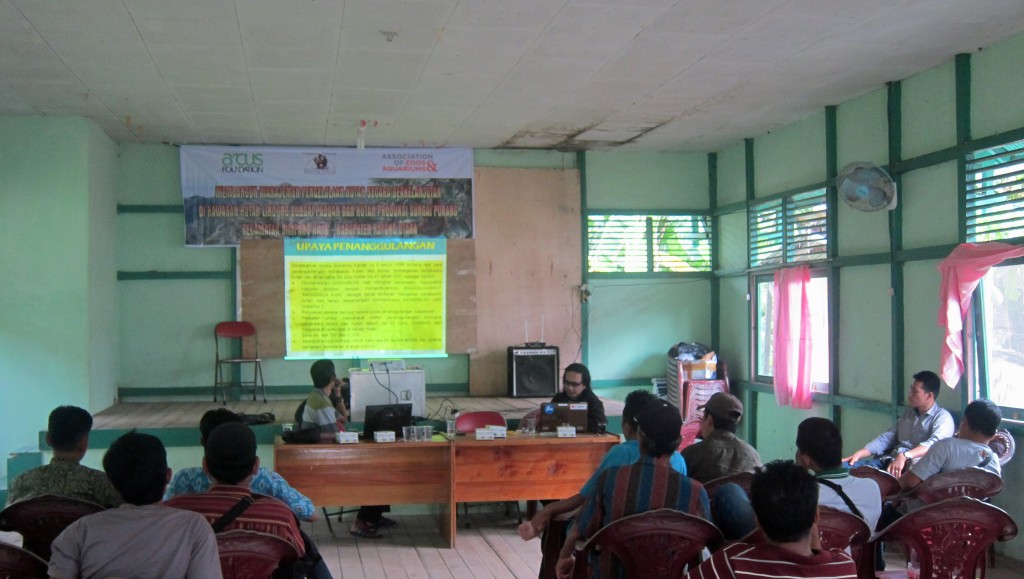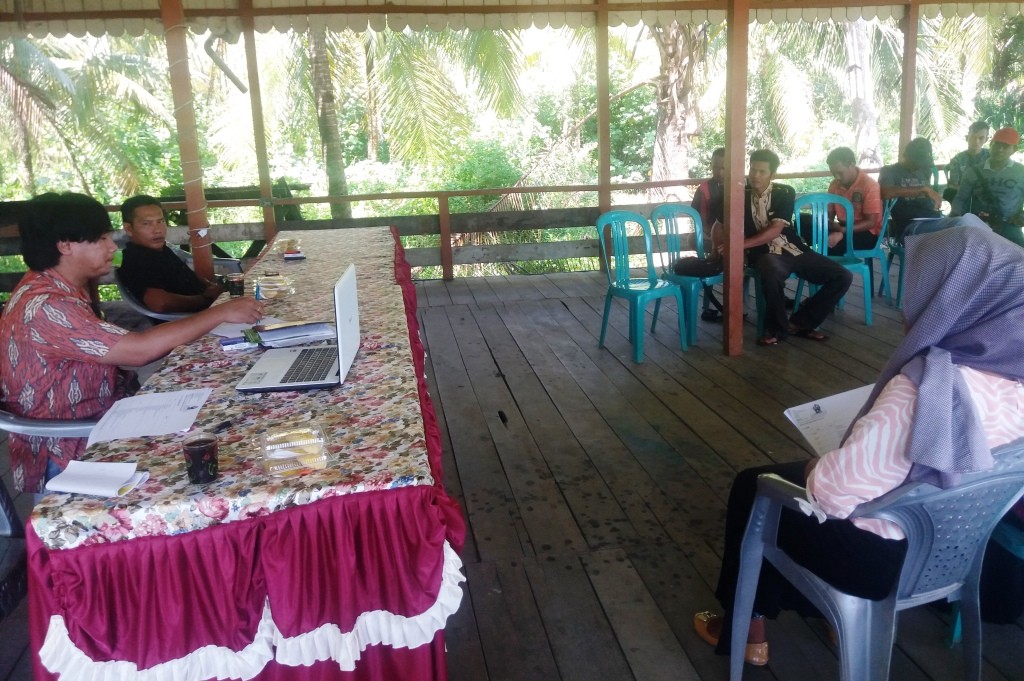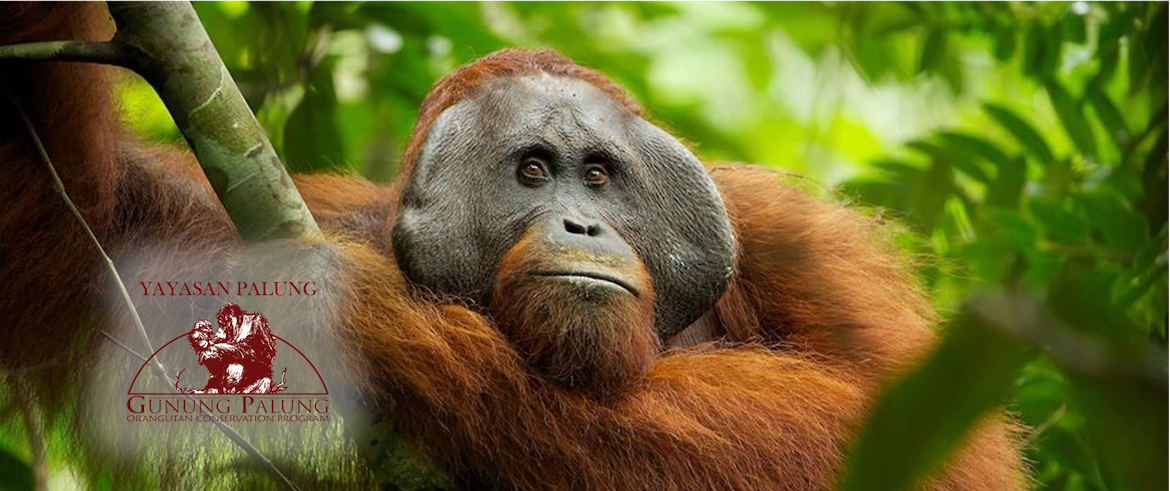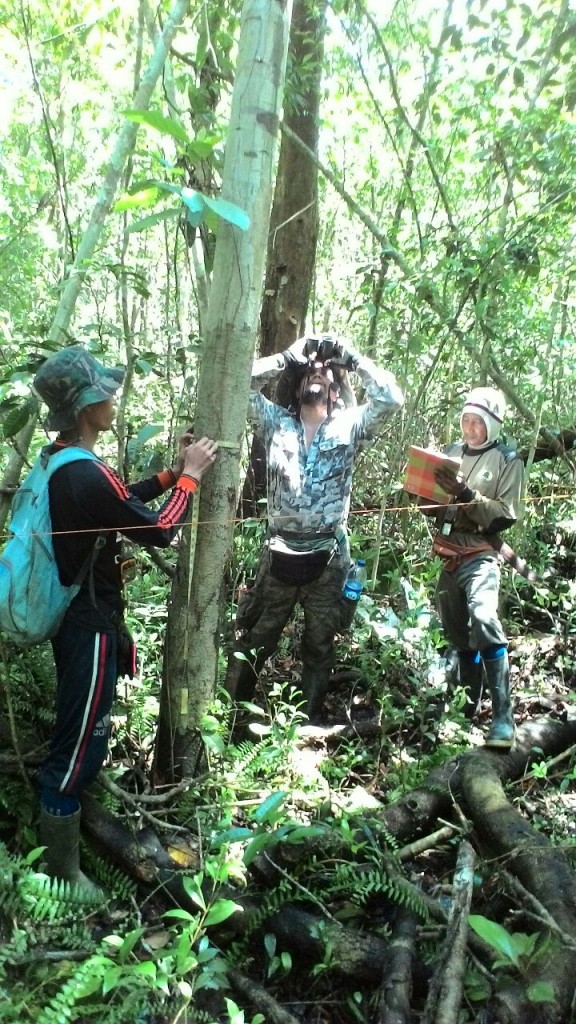By Cassie Freund, Program Director
The Community Forest Initiative, or Hutan Desa, as it is known in Indonesia, is one of GPOCP’s core orangutan conservation programs. For the past two years we have been working with over 90 people in five villages to the north of Gunung Palung National Park, helping them through the process of obtaining the legal management rights to approximately 7,500 hectares of peat swamp forest. Our goal is to protect these forests from conversion for outside economic interests, such as oil palm, while simultaneously allowing local communities access to the myriad of benefits that come from living near a healthy rainforest. Through this strategy, we will also conserve thousands of hectares of crucial orangutan habitat in the Gunung Palung landscape. Part of this work is legal in nature, as there is a long bureaucratic process involved in securing a Hutan Desa. Another significant part of the program is capacity building for the Community Forest participants so that when they do receive the forest management rights, they have the knowledge and skills necessary to protect and conserve these lands.

GPOCP Program Manager, Edi Rahman, presents sustainable forest management guidelines at a training session in February.
Over the past eight months, supported primarily by funding from the Arcus Foundation and the Association of Zoos and Aquariums (AZA) Conservation Grants Fund, we have made substantial progress on all aspects of the Community Forest Initiative. First, we have designed a series of four sustainable forest management trainings for representatives from all five project villages. The first two sessions were held in February and April of this year, and focused on forest fires, sustainable management of peat swamp forests, and human-wildlife conflict. These trainings resulted in a public declaration, issued by the village heads and co-signed by GPOCP, International Animal Rescue, and the local Natural Resources Conservation Agency, that the communities will commit to preventing forest fires and illegal killing of wildlife in the Hutan Desa project area. This is a significant, concrete recognition of the importance of conservation by the five project villages. The third training of the series, which will teach participants how to effectively zone their forests for sustainable management, was held on May 30th.
The Kayong Utara regency government has enthusiastically supported our Hutan Desa work, with the stipulation that these villages benefit economically from their commitment to forest protection. To fulfill this need, we have begun integrating our Sustainable Livelihoods programs into the Community Forest program. Currently, we are performing Participatory Rural Assessments (PRAs) in each village to discern the level of commitment from each community. Our Sustainable Livelihoods projects are built on community participation, and without buy-in and dedication from villagers, our various livelihoods strategies (i.e. organic agriculture, Non-Timber Forest Product handicrafting, and fish farming) will not have a significant conservation impact. Each PRA lasts for approximately four days and includes socialization of our programs and a community meeting to discuss potential livelihood strategies. Thus far, two of the three villages we have surveyed are enthusiastic about becoming part of our Sustainable Livelihoods program, and the remaining two PRAs are scheduled for June and July.

Sustainable Livelihoods Manager, Wendy Tamariska, presents our livelihoods strategies at a meeting as part of the Participatory Rural Assessment in Pemangkat village, Kayong Utara regency.
Finally, I am pleased to share that this month we also completed the first-ever rapid biodiversity surveys in the Paduan River community forest area, which encompasses four of the five Hutan Desa project villages. These surveys, led by GPOCP Environmental Education Coordinator (and resident botanist!) Edward Tang, focused on the diversity of tree species present in this approximately 6,000-hectare peat swamp forest. Tang and his team cataloged the trees present in 100 forest plots, spread across 10 survey transects throughout the forest. Preliminary results suggest that, although portions of this area were degraded by the 2015 forest fires, healthy rainforest, containing dozens of orangutan food species, is still present in much of the area. The team also observed and counted orangutan nests, which should help us come up with a more accurate estimate of the size of the orangutan population in this forest. We aim to complete the analysis of the rapid survey data and produce a full report before the end of June, which will be shared with the Kayong Utara Department of Forestry, the project villages, and other relevant stakeholders.
GPOCP’s Community Forest Initiative is a great demonstration of our comprehensive approach to orangutan conservation. By integrating community forestry and capacity building with sustainable livelihoods, environmental education, and scientific research efforts, we are well on our way to protecting over 7,000 hectares of forest in the Gunung Palung National Park landscape. This coming week our legal documents and the official Hutan Desa proposal will be ratified by the Kayong Utara regency head, after which it will be sent to the national Ministry of Forestry for final approval. After nearly two years of coordinating and promoting this strategy with the local Department of Forestry and the Gunung Palung National Park Bureau, we are confident that our conservation efforts will succeed, creating an immense positive impact on both the orangutans and people that inhabit the Hutan Desa project area. We would like to sincerely thank all of our funders who support this work, including the Arcus Foundation, AZA, the Woodland Park Zoo, and the Conservation, Food and Health Foundation.







